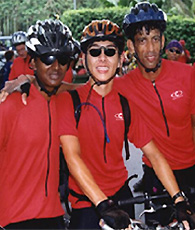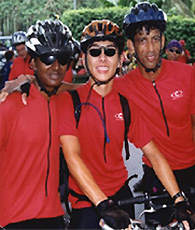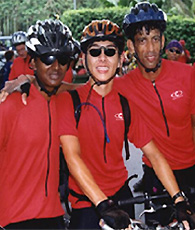Roger Winder, who is currently in Seremban on a 900-kilometre charity bike ride spoke to Fridae before he went on the road about the ride, his pet project - a recently relaunched HIV/AIDS/STI prevention programme targeting MSM, and the danger of a growing sense of complacency regarding HIV among the gay community in Singapore.

Roger (right) with 2 other cyclists at Riding for Life 1999.
Riding for Life 2003 is jointly organised by Singapore's Action for AIDS (AfA) and Malaysian AIDS Council. Over 70 riders and support crew are currently on the road to raise funds and awareness for HIV/AIDS prevention and care. Show your support by donating generously, please click here for details.
About Riding for Life (RfL)
æ: Can you tell us a little about RfL and how much does AfA hope to raise from RfL2003?
roger: It's primarily a fund-raising cycling event but also doubles up as an awareness raising-event, attracting people who either feel for the cause or are keen on cycling or who fall into both categories. It's a challenge - I think - on two counts, training for and completing the ride, as well as raising funds and sometimes having to deal with people's prejudices and misconceptions. We are hoping to attract about 15-25 participants [support crew and riders], each raising about $2,000, so the target would have been about $30,000 - $50,000. Of course, the economic crisis [the war and the S-acronym] has affected the amount we were hoping to raise.
æ: Why has AfA decided to co-organise the ride with the Malaysian AIDS Council (MAC)?
roger: We had always hoped for Malaysian involvement in the spirit of goodwill between the two countries and their respective HIV-related organisations but the timing in the past had not been convenient for MAC/MAF (Malaysian AIDS Foundatuion) Before RfL, AfA and MAC enjoyed a very cordial working relationship but had not [to my knowledge] officially collaborated on a project. MAC/F have been a tremendous help in getting things organised for this ride and we are very grateful for their involvement.
æ: You had participated in the inaugural ride in 1999. Describe your experience and tell us what is it that makes you want to do the rife a second time.
roger: The ride in 1999 was an exhilarating experience. We trained for about six months prior to the actual ride, and it was during this training period that many of the riders managed to get to know each other and to bond. Some of us went out together on a purely social basis after the ride and stayed in touch, even until today.
Personally, I developed a very special friendship with a [then] 17-year-old rider, a generally gregarious young lad who was slightly intimidated by being one of the youngest in the group but who seemed to feel more secure when his 'older brother' was around. We were room-mates for the actual ride [when we stopped at hotels at the end of each day's ride] and got along amazingly well, so much so that people noticed and were wondering whether anything more was happening.
The ride itself was gruelling, especially towards the end. Through the ride, we had to deal with exceedingly hot weather, strong head winds, undulating terrain, and heavy traffic in more populated towns. Often, it helped to be in a smaller group of riders, who could take turns to deal with the head winds, keep each other's spirits ups, and help each other in other ways.

Roger (right) with 2 other cyclists at Riding for Life 1999.
AIDS and the gay community
æ: You are also the co-coordinator for a HIV/AIDS/STI prevention programme targeting MSM (Men who have Sex with Men) which was relaunched in August last year; what is the take home message for this programme?
roger: Have your fun... without taking too many risks!
æ: What else needs to be done and what can the gay community expect?
roger: I guess you know that we re-launched the MSM Programme with a survey of knowledge, attitudes and behaviour among MSM in Singapore [we are very grateful to fridae.com for helping to publicise the online version!]. I didn't want to make too many assumptions in planning out intervention measures - I wanted the measures to be based on as accurate a picture of the actual situation as possible.
We have done the analysis of the results and will be disseminating the results soon [after I get back from the ride]. I think the community [which helped to provide the data] should be informed of the findings and of certain problematic issues, which have implications for its sexual health.
The findings have been used to design new sexual health material targeted at the MSM community, which is currently being developed and will be distributed from mid-July onwards. The material covers the specific problematic issues, which the survey revealed.
We have conducted a few safer sex workshops and plan to conduct more after we have improved on the format. We are also training volunteers to handle basic issues related to sexuality and sexual health. These volunteers will then man a phoneline, be in Internet chartrooms or offer information/support face-to-face.
We are also setting up a resource centre for the community in the hope of contributing towards its infrastructure and to meet the needs of individuals who need information and other resources. Finally, we will be conducting another survey to assess the effectiveness of the steps we have taken.
æ: From your observation through informal interaction and surveys, what do think is the level of AIDS awareness in Singapore? Would you say the community in general is better informed than a decade ago?
roger: Most people in the community have the basic knowledge but there are certain gaps that need to be addressed, such as about oral sex, non-risk situations, use of the appropriate lubricants, and the availability of truly anonymous testing. There is also a significant amount of risk behaviour going on, especially with regular partners. There is certainly much room for improvement and we will be working at it.
æ: With infection rates being one of the lowest in Asia, do you think there's a sense of complacency among the community?
roger: HIV remains fairly invisible within the MSM community, mainly because those who are HIV-positive manage to keep their status secret effectively and NOT so much because the numbers are that low. As such, many people do not come into contact with anyone they know to have the condition. HIV seems less of a threat and there is less urgency with respect to adopting risk reduction measures.
æ: What are the most common myths you've heard about AIDS?

Roger (right) with 2 other cyclists at Riding for Life 1999.
You're safe if you're the top.
Oral sex is high risk, rimming carries risk.
You can use oils, creams, lotions, Vaseline, and shower gel with condoms.
The Anonymous test site is only anonymous if you test negative.
æ: With sex between men being illegal in Singapore, what are the difficulties you face in planning education campaigns?
roger: We have to make sure that our efforts are conducted in safer MSM spaces and that our material is distributed only at such places. This means that we miss out on MSM who do not frequent such places, often the more closeted ones. The less accessible MSM, especially those who have anonymous encounters, are the ones that we worry about.
There is no significant problem in terms of developing targeted material, even in terms of the images, because we have to keep in mind that some segments of the community would not react well to explicit images or language. As such, we would try to avoid such images and language anyway.
All about Roger
æ: When did you realise you were gay? What was the process like?
roger: I suppose, as for most people, I felt attraction for guys from a young age [as early as 6 or 7] but did not think of it in sexual terms until much later [in my mid-teens]. Even then, I did not deal with it seriously until I was in my second year at university. It was only when I was about 24 or 25 that I actually 'came out.' Yeah, I was a very late bloomer and missed many opportunities in my early years (grins).
æ: Are you out to family and friends? If yes, could you tell us something about it? Is it an important factor in your life?
roger: I am out to my closer straight friends. With other straight friends and acquaintances, I don't feel the need to share more private and intimate aspects of my life. I don't make a show of being interested in gals either, though.
Family is a different kettle of fish. I am sure some of them suspect but I feel it is more prudent not to 'come out' to them. I am not yet ready to deal with their reactions, which are likely to be very adverse. I plan to do it in my own time, when I am ready.
æ: Have you ever encountered prejudice because of your gender/sexuality? How did you deal with it?
roger: No major problems. All the straight friends I've told have taken it well.
æ: What do you think we need most in Asia's gay and lesbian community?
roger: Less belligerence and suspicion in dealing with the straight crowd. In other words - less reverse oppression. I don't think we need to be so defensive and reactionary all the time. Also, perhaps more unity within the LGBT communities. There is significant discrimination and intolerance within the community, which doesn't reflect well on us.
æ: What advice would you give to someone who is trying to come to terms with his or her sexuality?
roger: Do it in your own time, don't let anyone rush you. Find friends who are supportive and understanding and who do not pressure you into doing things you are uncomfortable with, and don't take unnecessary risks in terms of sex, start out slow and steady...
Fridae.com is the official portal sponsor for RfL 2003.











 列印版本
列印版本










讀者回應
搶先發表第一個回應吧!
請先登入再使用此功能。